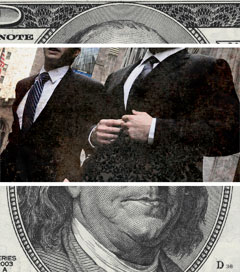Did you know that Truthout is a nonprofit and independently funded by readers like you? If you value what we do, please support our work with a donation.
Wall Street has given $41 million in campaign contributions to the members of the Congressional “supercommittee” charged with finding $1.5 trillion worth of deficit reduction measures, according to a report released today by two watchdog groups.
The finance, insurance and real estate sector spent $3.7 billion on lobbying and campaign contributions from 1999 to 2008, according to the report, and the 12 members of the bipartisan Joint Select Committee on Deficit Reduction have all reaped the benefits.
“Wall Street bought the deregulation that led to our economic collapse and the American public has paid the price,” said Nick Nyhart, president and CEO of Public Campaign, the group that co-authored the report. “The supercommittee should not give Wall Street and big banks another free ride because of their campaign cash.”
Congressional veterans Sen. John Kerry (D-Massachusetts) and Sen. Max Baucus (D-Montana) top the list, having each received about $6 million in contributions from the financial sector during the course of their careers in Washington. The top GOP recipient on the committee, Sen. Jon Kyl (R-Arizona), has received $5.2 million from the sector.
Donations from the political action committees and executives of Bank of America, JPMorgan Chase and Wells Fargo – banks that received $95 billion in federal bailout funds – account for one-fifth of the $4.3 million in campaign cash donated by commercial banking interests to the 12 supercommittee members.
Supercommittee co-chair Rep. Jeb Hensarling (R-Texas) received the most from the big banks. Bank of America, JP Morgan Chase and Wells Fargo have given Hensarling a total of $188,962 during his Congressional career. Hensarling also serves as the vice chair of the House Financial Services Committee and has received a total of $3.9 million from financial interests.
The report also identifies 27 former or current aides to supercommittee members who have worked as lobbyists for the financial industry. Manny Rossman, for example, was Kyl's chief of staff before landing a position at the Breaux Lott Leadership Group, where his clients include Citigroup, Goldman Sachs and Prudential Financial.
Public Campaign, a campaign finance reform group, teamed up with National Peoples Action (NPA) to create the report, which is based largely on numbers from the nonpartisan Center for Responsive Politics.
NPA hopes the supercommittee members ignore Wall Street's political influence and tax America's wealthiest investors and businesses as a solution to the deficit. Reforms like ending the “hedge fund loophole,” which allows hedge fund managers to income taxes at a lower rate, and instituting a “financial speculation tax” can generate over a trillion dollars, according to the NPA.
“Wall Street and the big banks are trying to buy their way out of paying their fair share,” said NPA Director George Goehl. “We know where the money is to rebuild our economy and it's not in the pockets of school children or in Grandma's pension – it's on Wall Street.”
NPA has helped working Americans organize direct actions across the country to hold Wall Street and big banks accountable for the financial crisis.
Media that fights fascism
Truthout is funded almost entirely by readers — that’s why we can speak truth to power and cut against the mainstream narrative. But independent journalists at Truthout face mounting political repression under Trump.
We rely on your support to survive McCarthyist censorship. Please make a tax-deductible one-time or monthly donation.
